Note: As an affiliate, I earn a small commission from qualifying purchases made through links in this post. This helps support my work, but it won't cost you any extra. For more information, please read my full disclosure here.
This blog will give you the best tips to stop period pain effectively!
Hey there, my lovely ladies!
I hope you’re all doing well. Today, I want to talk about something that many of us have dealt with at some point in our lives – period pain. I’ve been there, too, and I completely understand how debilitating and frustrating it can be.
But don’t worry; I’m here to share my own experiences and some easy-to-understand tips that have helped me find relief from those pesky period cramps.
Period pain is something that affects many of us, and it can be different for everyone. Some of us might experience mild discomfort, while others go through more intense pain. Regardless of where you fall on that spectrum, I believe that we can all benefit from a little extra comfort during that time of the month.
So, if you’re tired of being curled up in bed with a heating pad and want to explore some effective ways to stop period pain, keep reading!
Reasons Why You Have Period Pain
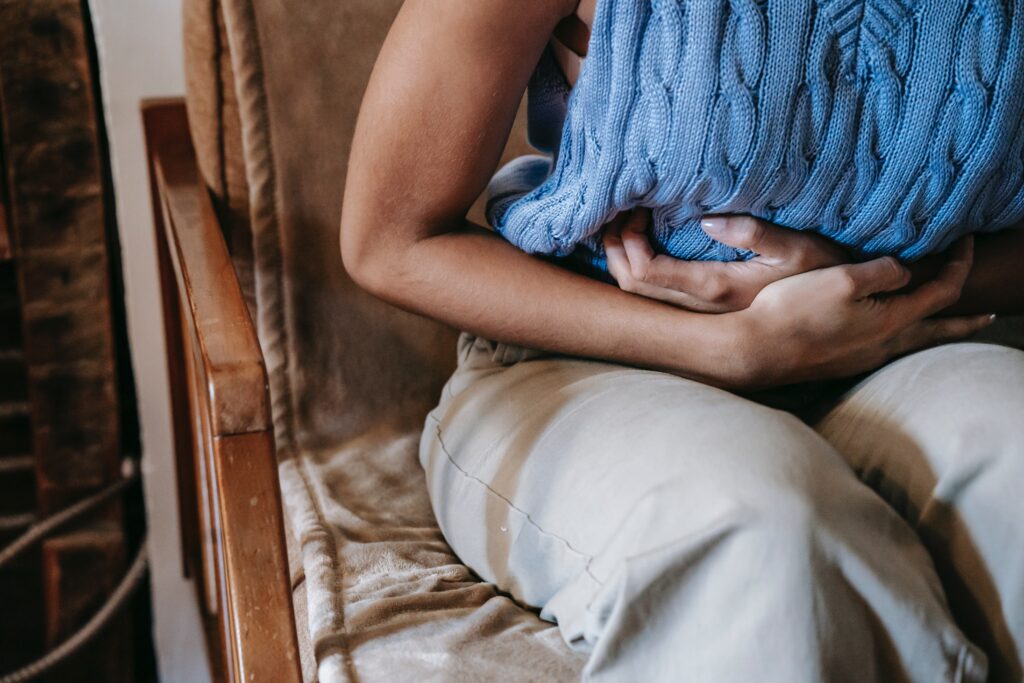
Before we dive into the ways to ease period pain, it’s important to understand why it happens in the first place.
Doctors aren’t entirely sure why some of us experience those uncomfortable cramps while others breeze through their periods with little to no pain. However, there are a few factors associated with more intense period pain:
- Heavy menstrual flow: If you find yourself reaching for extra pads or tampons during your period because of heavy bleeding, you might also be more prone to cramps. The extra blood flow can lead to stronger contractions in your womb.
- Young age or early periods: If you’re under the age of 20 or have just started menstruating, your body might still be adjusting to this new routine. Younger individuals often experience more noticeable period pain.
- Prostaglandin sensitivity: Prostaglandins are natural compounds in our bodies that influence the contractions of the womb muscles. If you produce an excess of prostaglandins or are particularly sensitive to them, you’re more likely to experience cramps.
- Having your first child: For those of us who have had the joy of becoming mothers, you may have noticed that your period pain changed after giving birth. It can sometimes become more intense, especially during the first few postpartum cycles.
During your period, your womb muscles contract and relax to help shed the lining built up over the month. These contractions are entirely normal, but sometimes they lead to cramps. In addition to cramps, some of us may also experience:
- Nausea: Nausea during your period is that queasy, unsettled feeling in your stomach that might make you feel like you could vomit (although not everyone actually vomits). It’s often caused by the same prostaglandins we mentioned earlier. These little chemical messengers can affect your stomach and intestines, leading to that uncomfortable sensation.
- Vomiting: Vomiting, or actually throwing up, can occur in some individuals during their menstrual cycle. This can be particularly distressing and is also attributed to the influence of prostaglandins on the stomach and intestinal muscles. If you experience vomiting regularly during your period, it’s a good idea to consult with a healthcare professional for further evaluation.
- Diarrhea: Diarrhea during your period can be quite uncomfortable and inconvenient. Prostaglandins, once again, are often responsible for this symptom. They can cause the smooth muscles of your intestines to contract more vigorously, leading to loose or watery stools.
- Headaches: Hormonal fluctuations, particularly the drop in estrogen levels that occurs during menstruation, can trigger headaches for some people. These headaches can range from mild tension headaches to more severe migraines. Dehydration, which can accompany heavy bleeding, may also contribute to headaches.
14 Best Ways to Stop Period Pain Effectively
1. Breath deeply

One simple and effective way to soothe period cramps is to take deep breaths. It might sound too easy, but deep breathing can help relax your muscles and reduce the pain. Here’s how to do it:
- Find a quiet, comfy spot to sit or lie down.
- Close your eyes and take a slow, deep breath in through your nose, counting to four as you do it.
- Then, exhale slowly through your mouth, counting to four again.
- Repeat this deep breathing exercise for a few minutes, focusing on your breath and letting go of tension with each exhale.
2. Sip on warm water
You know, sometimes we all need a little nudge to try something new. I’ll admit, I didn’t take my mom’s advice right away when she suggested drinking warm water for period pain relief. I was a die-hard fan of ice-cold drinks, and the idea of warm water didn’t exactly appeal to me.
But then, one month, I faced some seriously severe period pain. It was so bad that I was willing to try just about anything for relief. So, I finally gave warm water a shot. And you know what? It worked like a charm. The relief I felt was undeniable, and I couldn’t believe I had waited so long to try it.
Sometimes, it takes experiencing the worst of something to open up to new ideas. So, if you’ve been hesitant to try warm water, take it from someone who’s been there – it might be the solution you’ve been searching for during those tough period days.
3. Drink herbal tea
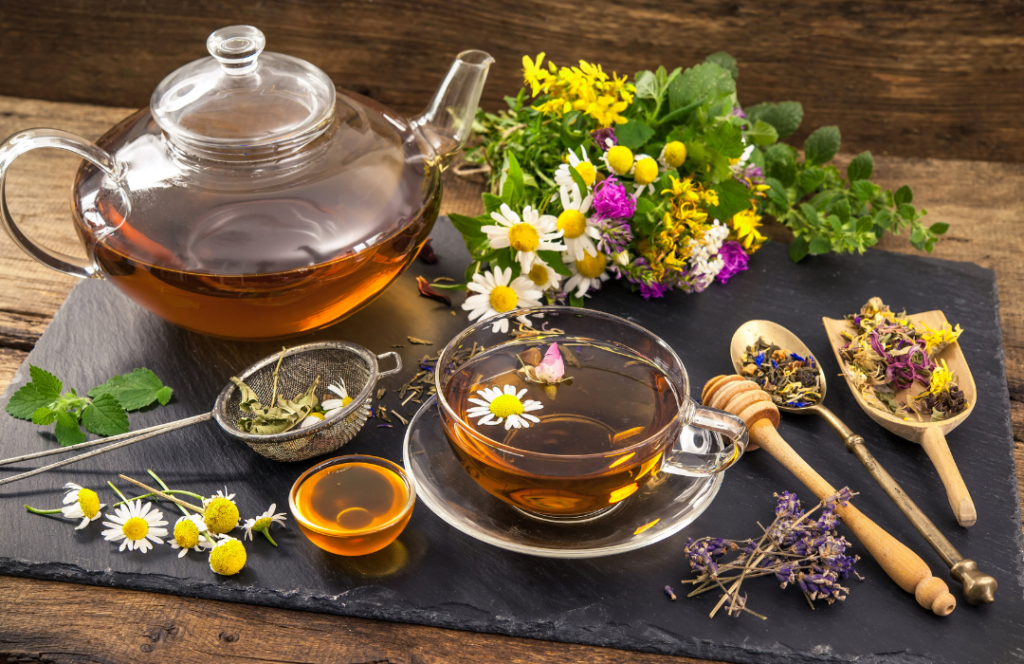
When it comes to dealing with period cramps, sometimes the simplest remedies can be the most effective. One such remedy that I’ve come to love is herbal tea. Now, I’ll admit, I used to be a bit skeptical about it, but let me tell you – it’s a game-changer.
Herbal teas often contain ingredients like ginger, chamomile, peppermint, and raspberry leaf, all known for their soothing and pain-relieving properties. These herbs work together to ease those cramps and bring comfort.
Staying hydrated is key during your period. Herbal tea not only provides the much-needed hydration but also adds a comforting touch to your self-care routine.
Just like warm water, herbal tea’s gentle warmth can help relax your tense muscles, making those cramps feel less intense.
With a wide variety of herbal teas available, you can choose the one that suits your taste buds best. Whether you prefer something mild like chamomile or a spicier option like ginger, there’s a herbal tea for everyone.
4. Eat anti-inflammatory foods
Loading up on anti-inflammatory foods can be your secret weapon against period pain. These foods can help reduce inflammation and lessen those cramps.
Think fruits like berries and oranges, veggies like spinach and kale, and healthy fats like avocados and nuts. They’re not just good for your health; they’re good for your cramps too!
5. Eat dark chocolate
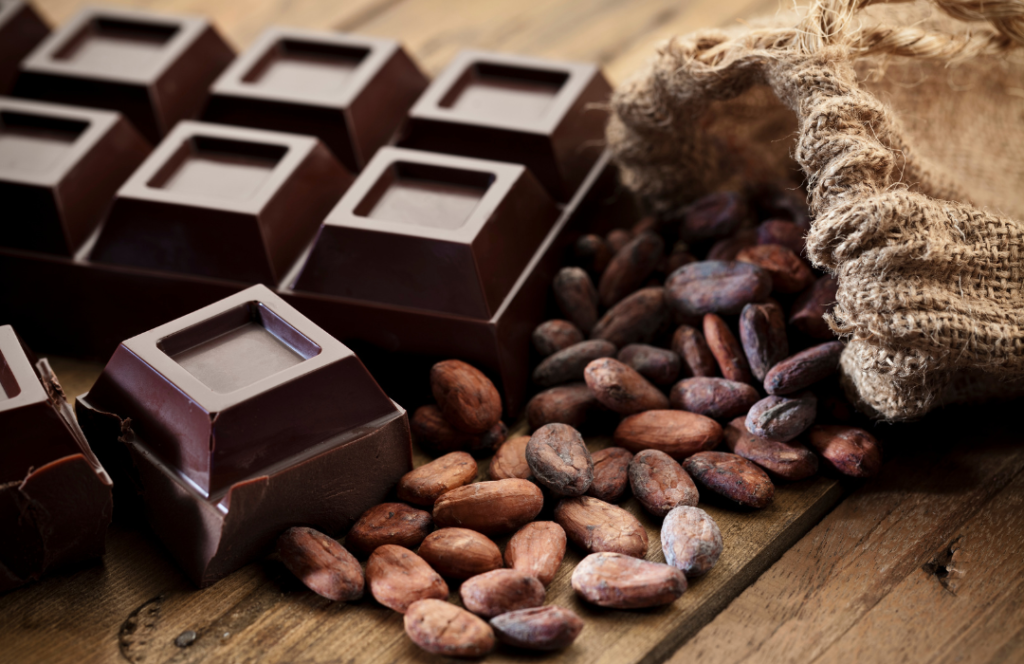
Let’s talk about everyone’s favorite part – dark chocolate! You might be surprised to know that dark chocolate, especially the kind with a high cocoa content, can be a delightful ally during your period. It contains natural compounds like flavonoids that could work their magic in two fantastic ways.
Firstly, these compounds might help improve your mood. You know those mood swings that sometimes accompany your period?
Dark chocolate can give you a little mood boost, making those ups and downs a bit more manageable. Just remember, moderation is key here. A small piece of dark chocolate can go a long way in bringing you comfort without overdoing it on the calories.
Secondly, dark chocolate may also have mild pain-relieving properties. It can help relax your muscles and ease cramps. So, the next time you’re reaching for a snack, consider treating yourself to a square or two of dark chocolate.
6. Skip the coffee
I get it, that morning cup of joe can be a lifesaver, but during your period, it might not be your best friend.
Coffee contains caffeine, which can sometimes worsen cramps by causing your muscles to tense up.
This tension can lead to more discomfort. If you can, try swapping out your coffee for herbal tea or a decaffeinated alternative during your period. Your body will thank you for the gentler wake-up call.
7. Try fetal sleep position
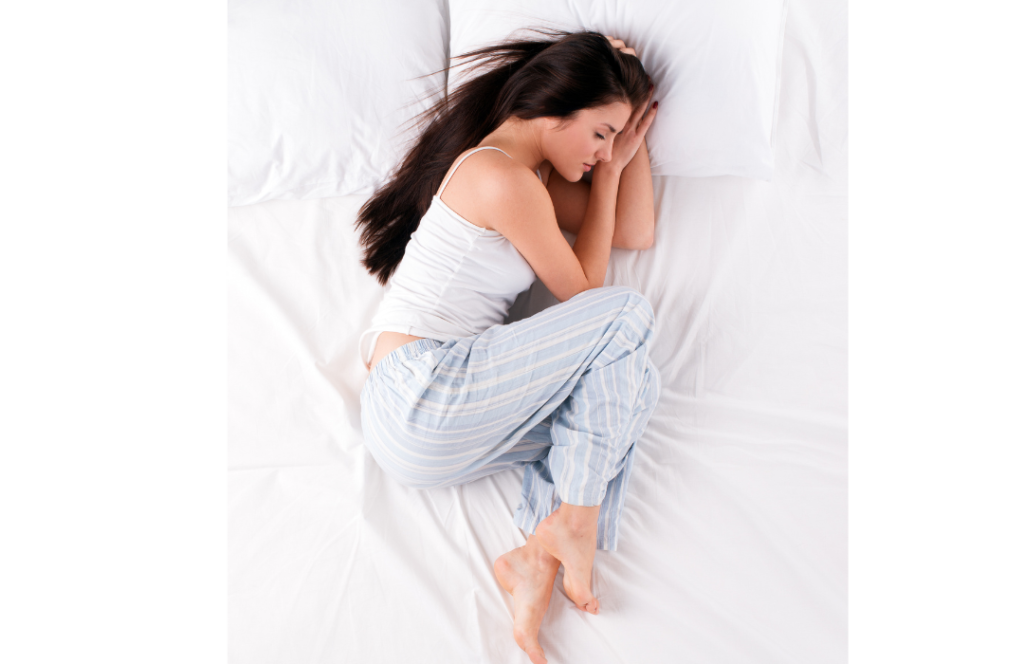
The fetal sleep position can help relax your abdominal muscles, relieve tension, and reduce cramping. It’s like giving yourself a comforting, self-hug that tells your body it’s okay to relax.
Here’s how to do it:
- Lie on your back in bed or on a comfortable surface.
- Gently draw your knees up toward your chest.
- Curl your body into a loose fetal position, with your knees close to your chest and your back slightly rounded.
- If it feels comfortable, you can even hug a pillow to your chest for extra support.
8. Apply heating pads
One piece of advice I swear by, and I often share with my girlfriends when they ask how to get immediate relief from period pain, is to use heating pads. They may not work in just a few seconds, but trust me, they’re incredibly effective.
Heat helps to increase blood flow and relax your muscles, which can significantly reduce the intensity of your cramps.
Here’s how to do it:
- Grab a heating pad or a hot water bottle (a DIY option works great too).
- Place it on your lower abdomen or lower back – wherever you’re feeling the most discomfort.
- Relax and let the warmth work its magic.
9. Massage with essential oils
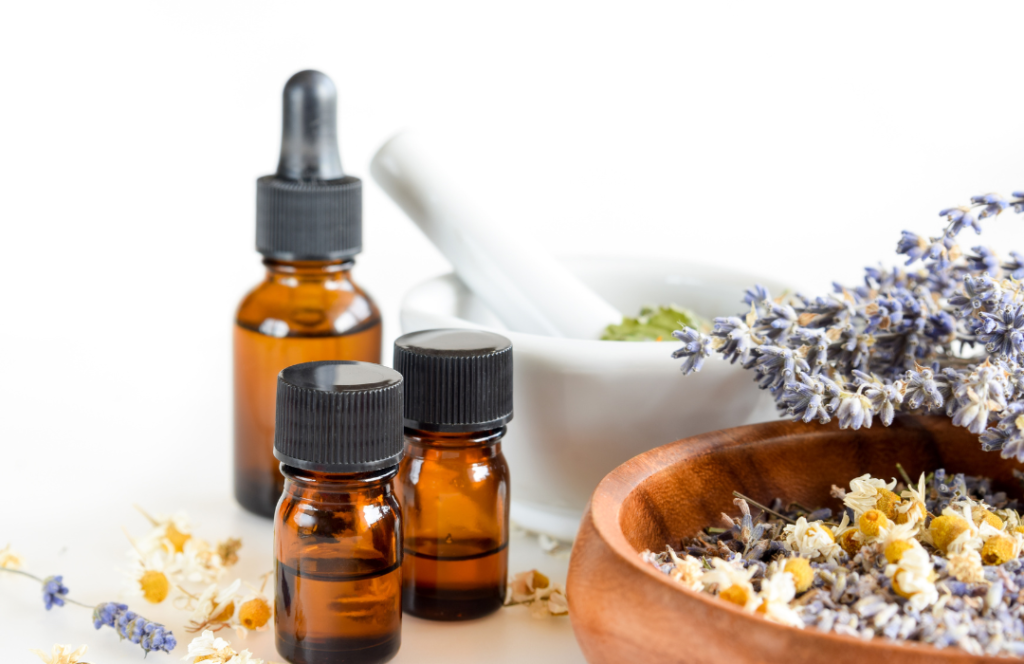
Essential oils can help relax your muscles, reduce inflammation, and alleviate cramps. Plus, the act of massaging itself can be incredibly comforting during your period.
Here’s how to do it:
- Choose a calming essential oil like lavender, chamomile, or peppermint. These oils are known for their relaxation and pain-relief properties.
- Dilute a few drops of the essential oil in a carrier oil like coconut or jojoba oil. This helps prevent skin irritation.
- Gently massage the oil blend onto your lower abdomen in a circular motion. Apply gentle pressure but be mindful not to press too hard.
- Take slow, deep breaths as you massage. Close your eyes, relax, and let the soothing scent of the essential oil calm your senses.
10. Take supplements
When it comes to finding extra support for period pain relief, supplements can be a valuable addition to your routine. They can provide your body with essential nutrients that may help alleviate cramps and discomfort.
Here are a few supplements to consider:
- Magnesium: Magnesium is known to help relax muscles and reduce cramps. You can find magnesium supplements at your local pharmacy or include magnesium-rich foods like leafy greens, nuts, and whole grains in your diet.
- Vitamin B6: This vitamin may help regulate your mood and reduce the severity of menstrual cramps. You can find vitamin B6 in supplement form or in foods like bananas, poultry, and chickpeas.
- Omega-3 fatty acids: Omega-3s have anti-inflammatory properties that can help ease period pain.
You can take omega-3 supplements or add more fatty fish like salmon and walnuts to your diet. - Calcium: Adequate calcium intake is essential for muscle function. Consider calcium supplements or opt for calcium-rich foods like dairy products, tofu, and leafy greens.
- Vitamin D: Vitamin D is essential for overall health, and some studies suggest it may help reduce the severity of menstrual cramps. You can get vitamin D from supplements or from foods like fortified dairy products and fatty fish.
Before starting any supplement regimen, it’s a good idea to consult with a healthcare provider or a registered dietitian. They can help you determine the right supplements for your needs and ensure they won’t interact with any other medications you might be taking.
11. Do gentle exercise
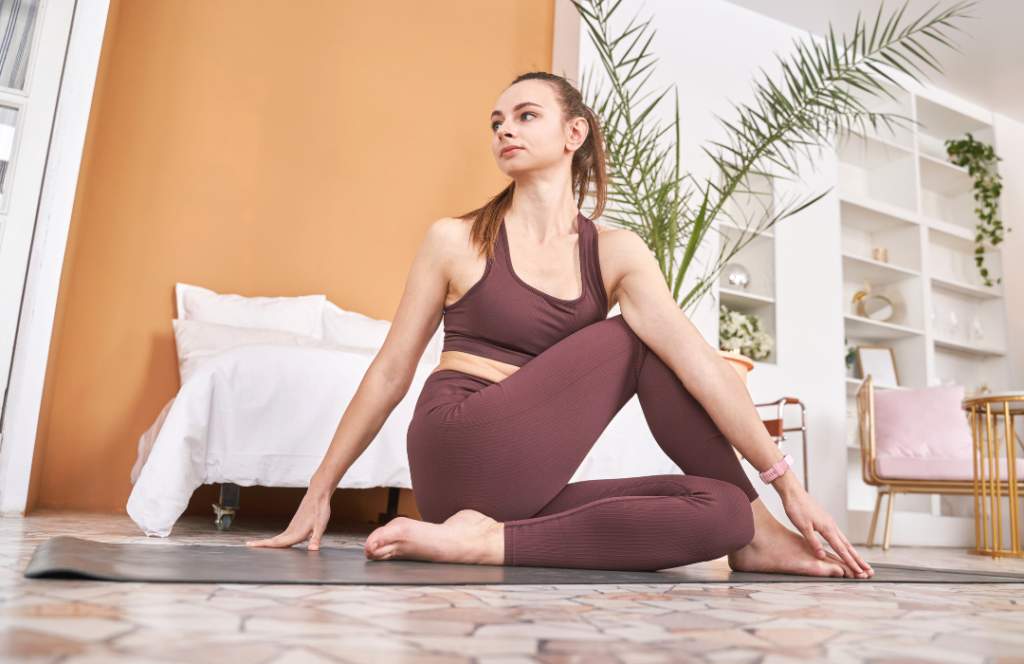
Believe it or not, gentle exercise can be your ally in the battle against period cramps. While it might sound counterintuitive to get moving when you’re feeling uncomfortable, light exercise can actually help ease the pain.
When you engage in light exercise, such as brisk walking, yoga, or stretching, you promote better blood circulation. This increased blood flow can help relax tense muscles and reduce cramping.
Exercise releases endorphins, those feel-good hormones. They can elevate your mood and make you feel less irritable or down during your period.
Exercises that target your core, like Pilates, can help build strength in your abdominal muscles, potentially reducing cramping.
12. Do meditation

When cramps hit, they can be pretty overwhelming. It’s easy to let them dominate your thoughts and your day.
Meditation, though, has been like a quiet refuge amidst the chaos of cramps. Through mindfulness, I’ve learned to acknowledge the pain without letting it completely take over. It’s almost like creating a little space for myself within the discomfort.
Stress and cramps seem to go hand in hand for many of us. I noticed that the more stressed I felt, the worse my cramps became. That’s where meditation has been my lifeline. Those deep, slow breaths and the guidance in meditation sessions have become my escape from tension, helping me relax my body.
It’s not just about easing the physical pain; meditation has also had a surprisingly positive impact on my mood. This practice encourages the release of those feel-good hormones, and it’s made those irritable moments during my period a bit more manageable.
Here’s how I typically go about it:
I find a quiet, comfy spot to either sit or lie down. Closing my eyes, I take those slow, deep breaths. Inhaling deeply through my nose, I count to four, and then I exhale slowly through my mouth, counting to four again. I focus on my breath, and with each exhale, I release any tension or pain.
There are times when I turn to guided meditation apps or videos; they help me get into the meditation groove.
Meditation is a skill that improves with practice. It’s completely normal if your mind wanders initially – mine certainly did. But with time, I’ve become better at finding that inner peace, even in the midst of discomfort.
13. Take over the counter medicine like ibuprofen
Sometimes, when period cramps hit hard, you need a little extra help to get through the day. That’s when over-the-counter medicines like ibuprofen can be a real lifesaver.
Medicines like ibuprofen are non-prescription pain relievers that belong to a class of drugs called nonsteroidal anti-inflammatory drugs (NSAIDs). They work by reducing inflammation, which can help ease the pain and discomfort associated with period cramps.
It’s a good idea to reach for over-the-counter pain relievers when your cramps are particularly intense and interfering with your daily activities. However, always follow the recommended dosage on the package and avoid taking them on an empty stomach to prevent stomach irritation.
Remember, while over-the-counter medicines can be effective, it’s essential not to rely on them as your sole solution. Combine their use with some of the other natural remedies and lifestyle changes mentioned earlier in this blog to create a well-rounded approach to managing period cramps.
14. Consider hormonal birth control
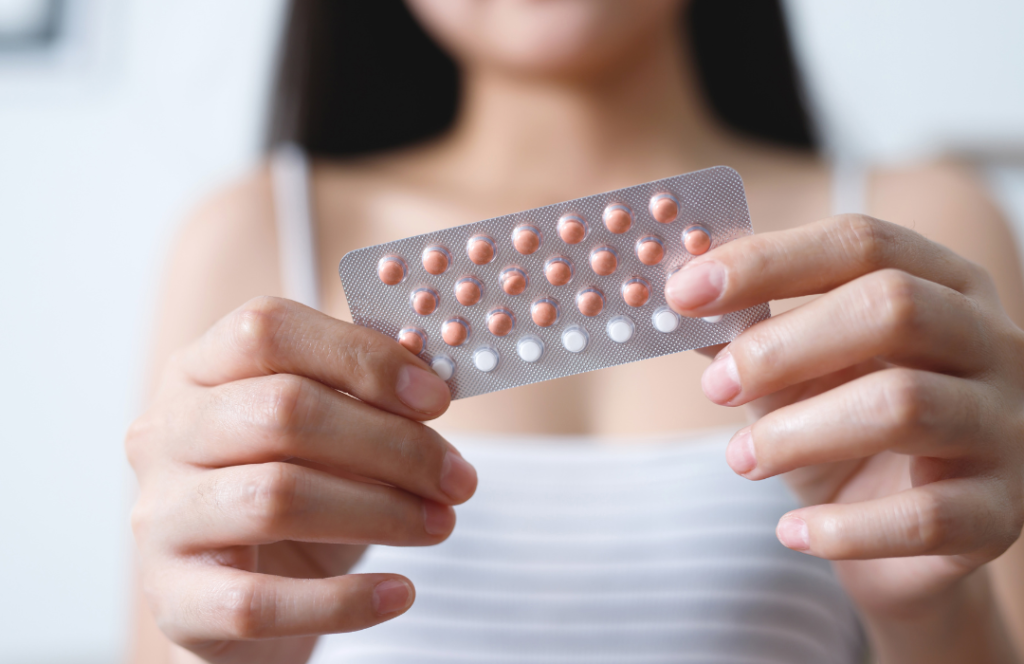
If you’re dealing with severe cramps that disrupt your daily life, this option could be a real game-changer, not just for contraception but also for managing and even reducing the intensity of your menstrual cramps.
Hormonal birth control methods like birth control pills, patches, or hormonal intrauterine devices (IUDs) release hormones that help regulate your menstrual cycle. They can make your periods lighter and less painful, which is like a sigh of relief for those who experience intense cramps.
By gently regulating your hormone levels, these methods can also help reduce the production of prostaglandins, those pesky compounds responsible for those painful cramps. This means less discomfort and more predictability during your periods.
Before taking any steps, I’d encourage you to reach out to a healthcare provider. They’re there to listen, discuss your options, recommend the most suitable method, and address any concerns or questions you may have.
It’s worth noting that while hormonal birth control can be a powerful solution for managing period cramps, it may not be the perfect fit for everyone. Your healthcare provider will consider your unique needs and circumstances to help you decide if it’s the right path for you.
Final Thoughts
I feel a deep connection with all of you who have joined me on this journey. Dealing with period pain is a shared experience, one that many of us encounter regularly. It’s an experience that unites us in our quest for relief and comfort.
I’ve personally walked the path of frustration and discomfort that comes with period cramps, and I hope the tips I’ve shared resonate with you. From warm water to herbal tea, from meditation to gentle exercise, and even considering hormonal birth control, there’s no universal solution. What matters most is finding what works best for you.
Remember, it’s absolutely okay to seek help, whether from your healthcare provider or through self-care methods. You deserve to experience your menstrual cycle with as much comfort and ease as possible.





